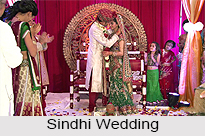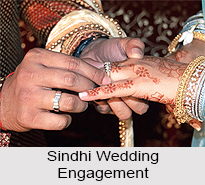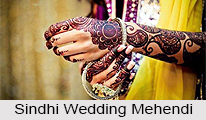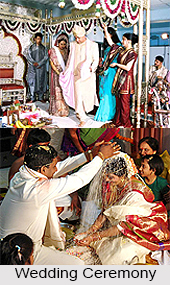 Hindu Sindhis in India are a mixed blend of the traditional Hindus and little bit of Sufism. They do not follow staunch Hindu rites in a hard and fast way. They are Sanatani Hindus and follow the Vedic rites. The day for Sindhi wedding is usually fixed on an auspicious day such as the Satyanarayan Chandsi or the New Moon day. Otherwise, there is this custom of doing a Gudhuro marriage in cases such as where a favorable muhurt cannot be decided by astrology. It is under such circumstances that the couple may go for Gudhuro marriage, which can be performed on any day after sunset. Some Sindhis used to sacrifice a goat to appease the Gods and the spirits to ensure a successful marriage. The latter is no more prevalent though.
Hindu Sindhis in India are a mixed blend of the traditional Hindus and little bit of Sufism. They do not follow staunch Hindu rites in a hard and fast way. They are Sanatani Hindus and follow the Vedic rites. The day for Sindhi wedding is usually fixed on an auspicious day such as the Satyanarayan Chandsi or the New Moon day. Otherwise, there is this custom of doing a Gudhuro marriage in cases such as where a favorable muhurt cannot be decided by astrology. It is under such circumstances that the couple may go for Gudhuro marriage, which can be performed on any day after sunset. Some Sindhis used to sacrifice a goat to appease the Gods and the spirits to ensure a successful marriage. The latter is no more prevalent though.
Sindhi wedding ceremony is an amalgamation of Hinduism and Sufism. Sindhi people originate from Sanatani Hindus and do not follow Hindu rites sternly. In fact Sindhi weddings are based on Vedic rites. Their weddings generally take place on an favorable day like the Satyanarayan Chandsi or the New Moon day. The Sindhi matrimonial customs & traditions are described below:
Pre Wedding Rituals
Kuchchi Mishri: People from the girls` side visit the boy`s place with a tray of sugar candy along with a small token amount of money. In case, the boy`s family accepts this shagun or token gift; it is believed that the proposal is approved. Then, both the parties take a little mishri (sugar candy), thus marking the end of the betrothal ceremony as well. This event is also called ladki rokna (engaging the girl).
Pakki Mishri: Pakki Mishri is the formal engagement, wherein the boy and the girl put rings in each other`s fingers. The girl`s family sends Groom`s wedding attire to his house along with other gifts. Sugar candy, the sacred thread, a coconut and traditional sweets accompany these gifts. There goes a Brahmin priest. He takes note of the names of the bride and the groom, consults their horoscopes and then tallying from the almanac fixes the exact time of marriage so that it is conducted during an auspicious period.
 Dev Bithana: Dev Bithana is an ethnic ritual that takes place five to six days before the wedding begins. In this a granary called gundro is prepared which is worshipped throughout the marriage ceremonies. This establishment of a totemic deity is known as Dev Bithana. A Brahmin priest does it. The gundro has to be placed in front of the couple. The priest puts some sacred objects such as the seven Haris, eight Patras or sons, and nine Bublans or covers. These are then worshipped. Then the family members apply tilak to the gundro. This formally marks the commencement of the nuptials. The commencement of a Sindhi marriage is initiated with the groom`s family inviting the ladies of the neighborhood to take part in the ceremonial singing of traditional wedding songs. There is also a lot of dancing and joyful merriment and these festivities go on every night till the day of the wedding. The bridegroom`s family distributes sugar to all the assembled visitors.
Dev Bithana: Dev Bithana is an ethnic ritual that takes place five to six days before the wedding begins. In this a granary called gundro is prepared which is worshipped throughout the marriage ceremonies. This establishment of a totemic deity is known as Dev Bithana. A Brahmin priest does it. The gundro has to be placed in front of the couple. The priest puts some sacred objects such as the seven Haris, eight Patras or sons, and nine Bublans or covers. These are then worshipped. Then the family members apply tilak to the gundro. This formally marks the commencement of the nuptials. The commencement of a Sindhi marriage is initiated with the groom`s family inviting the ladies of the neighborhood to take part in the ceremonial singing of traditional wedding songs. There is also a lot of dancing and joyful merriment and these festivities go on every night till the day of the wedding. The bridegroom`s family distributes sugar to all the assembled visitors.
Mehendi: Mehendi ceremony in Sindhi Wedding is performed 3-4 days earlier to the marriage, is celebrated amidst songs and fan fare. This is not originally a Sindhi ritual but has been incorporated after the Sindhis migrated to India.
 Sath: This is an interesting ritual where the bride & the groom a day before the wedding have to break the cover of a small earthen pot in one shot with the shoes they have been wearing since morning. The same shoes then has to be worn on the wedding day.
Sath: This is an interesting ritual where the bride & the groom a day before the wedding have to break the cover of a small earthen pot in one shot with the shoes they have been wearing since morning. The same shoes then has to be worn on the wedding day.
Wedding Ceremony
The marriage begins with the "thread ceremony" of the groom if he has not done it before. The bride and groom are seated next to each other and then the bride`s mother washes the feet of the couple placed in a plate while the pundit chants mantras. The couple then takes the phera`s round the holy fire. Here too a difference from any other Hindu marriage, there is an option of number of pheras. The couple can take three, four or seven pheras. The marriage comes to an end after parents and elders bless the couple.
Post Wedding Rituals
After the marriage, the bride opens the lock of the groom`s house, establishing her entry in to the new house. She sprinkles milk all over the house and puts salt in the hands of her in-laws who return it to her in the belief and hope that she will mingle freely with her new family. The bride is then gifted cash, clothes and gold.
More on Indian Religious Weddings
More on Indian Wedding Accessories
More on Types of Marriages
See also
 Hindu Sindhis in India are a mixed blend of the traditional Hindus and little bit of Sufism. They do not follow staunch Hindu rites in a hard and fast way. They are Sanatani Hindus and follow the Vedic rites. The day for Sindhi wedding is usually fixed on an auspicious day such as the Satyanarayan Chandsi or the New Moon day. Otherwise, there is this custom of doing a Gudhuro marriage in cases such as where a favorable muhurt cannot be decided by astrology. It is under such circumstances that the couple may go for Gudhuro marriage, which can be performed on any day after sunset. Some Sindhis used to sacrifice a goat to appease the Gods and the spirits to ensure a successful marriage. The latter is no more prevalent though.
Hindu Sindhis in India are a mixed blend of the traditional Hindus and little bit of Sufism. They do not follow staunch Hindu rites in a hard and fast way. They are Sanatani Hindus and follow the Vedic rites. The day for Sindhi wedding is usually fixed on an auspicious day such as the Satyanarayan Chandsi or the New Moon day. Otherwise, there is this custom of doing a Gudhuro marriage in cases such as where a favorable muhurt cannot be decided by astrology. It is under such circumstances that the couple may go for Gudhuro marriage, which can be performed on any day after sunset. Some Sindhis used to sacrifice a goat to appease the Gods and the spirits to ensure a successful marriage. The latter is no more prevalent though.

 Dev Bithana: Dev Bithana is an ethnic ritual that takes place five to six days before the wedding begins. In this a granary called gundro is prepared which is worshipped throughout the marriage ceremonies. This establishment of a totemic deity is known as Dev Bithana. A Brahmin priest does it. The gundro has to be placed in front of the couple. The priest puts some sacred objects such as the seven Haris, eight Patras or sons, and nine Bublans or covers. These are then worshipped. Then the family members apply tilak to the gundro. This formally marks the commencement of the nuptials. The commencement of a Sindhi marriage is initiated with the groom`s family inviting the ladies of the neighborhood to take part in the ceremonial singing of traditional wedding songs. There is also a lot of dancing and joyful merriment and these festivities go on every night till the day of the wedding. The bridegroom`s family distributes sugar to all the assembled visitors.
Dev Bithana: Dev Bithana is an ethnic ritual that takes place five to six days before the wedding begins. In this a granary called gundro is prepared which is worshipped throughout the marriage ceremonies. This establishment of a totemic deity is known as Dev Bithana. A Brahmin priest does it. The gundro has to be placed in front of the couple. The priest puts some sacred objects such as the seven Haris, eight Patras or sons, and nine Bublans or covers. These are then worshipped. Then the family members apply tilak to the gundro. This formally marks the commencement of the nuptials. The commencement of a Sindhi marriage is initiated with the groom`s family inviting the ladies of the neighborhood to take part in the ceremonial singing of traditional wedding songs. There is also a lot of dancing and joyful merriment and these festivities go on every night till the day of the wedding. The bridegroom`s family distributes sugar to all the assembled visitors.
 Sath: This is an interesting ritual where the bride & the groom a day before the wedding have to break the cover of a small earthen pot in one shot with the shoes they have been wearing since morning. The same shoes then has to be worn on the wedding day.
Sath: This is an interesting ritual where the bride & the groom a day before the wedding have to break the cover of a small earthen pot in one shot with the shoes they have been wearing since morning. The same shoes then has to be worn on the wedding day.

















